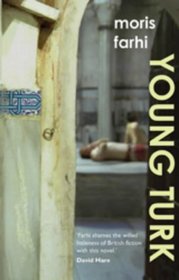Thirteen stories, each with their own narrator, are woven together to comprise this tapestry of life in Istanbul from the late 1930s to the mid-1950s. Although told through many mouths, the people are all somehow related, through friendship, kinship, schooling, or neighborhood. And while each story is it's own carefully crafted meditation on love, longing, friendship, sex, politics, or religion, they are bound by the common theme of what it means to be Turkish. Although the emphasis is on Turkish Jewry, narrative voices run the gamut, and include Muslim, Christian, Greek, Armenian, Donme, Gypsy, Levantine, and more, all of whom are proud Turks.
Most of the stories are concerned with earnest teenagers attempting to discover their place in the world. A world that is increasingly precarious, as World War II sets Europe ablaze and threatens to draw Turkey into the flames. For many of the characters, there are Jewish relatives to worry about, especially those in Nazi-occupied Greece. Several stories, touch upon the plight of the historically Jewish city of Salonica, where 90% of Jews were deported to death camps. The most memorable story revolves around the plan a few of the teenage boys have to sneak across the border in order bring of the boy's relatives back to Turkey using stolen British passports. Another memorable story revolves around a punitive tax imposed on all minority groups in 1942, when Turkey flirted with aligning itself with Germany. This was designed to strip all minorities, especially Jews, of their wealth, and was repealed 18 months later. The story concerns the efforts of people to help their Jewish neighbors.
Two figures appear throughout the stories as exemplars of what it means to be Turkish. Of course one is Ataturk, the founder of modern, secular Turkey, and his name is constantly evoked along the lines of "If Ataturk could see this, he wouldn't stand for it." The other is the poet Nazim Hikmet, whose praises are sung throughout. The voice for both of these is a progressive professor who becomes a hero for the young Turks who narrate these stories. Despite all the different narrators, the voice of the storytelling never shifts very much. Male, female, different classes, different backgrounds all sound more or less the same. The prose is a little too lush in painting the rich picture of Istanbul of fifty years ago, and the pervasive sense of tragedy gets somewhat wearying by the end of the 400 pages. Farhi's book is, in the final distillation, a plaintive cry for pluralism, multiculturalism, tolerance, and modernity that's entirely relevant to today, as Turkey struggles with the Kurdish question, EU membership, and Islamic fundamentalists. Probably of greatest interest to those interested in the Jewish angle, but worth reading by anyone with an interest in Turkey.
Most of the stories are concerned with earnest teenagers attempting to discover their place in the world. A world that is increasingly precarious, as World War II sets Europe ablaze and threatens to draw Turkey into the flames. For many of the characters, there are Jewish relatives to worry about, especially those in Nazi-occupied Greece. Several stories, touch upon the plight of the historically Jewish city of Salonica, where 90% of Jews were deported to death camps. The most memorable story revolves around the plan a few of the teenage boys have to sneak across the border in order bring of the boy's relatives back to Turkey using stolen British passports. Another memorable story revolves around a punitive tax imposed on all minority groups in 1942, when Turkey flirted with aligning itself with Germany. This was designed to strip all minorities, especially Jews, of their wealth, and was repealed 18 months later. The story concerns the efforts of people to help their Jewish neighbors.
Two figures appear throughout the stories as exemplars of what it means to be Turkish. Of course one is Ataturk, the founder of modern, secular Turkey, and his name is constantly evoked along the lines of "If Ataturk could see this, he wouldn't stand for it." The other is the poet Nazim Hikmet, whose praises are sung throughout. The voice for both of these is a progressive professor who becomes a hero for the young Turks who narrate these stories. Despite all the different narrators, the voice of the storytelling never shifts very much. Male, female, different classes, different backgrounds all sound more or less the same. The prose is a little too lush in painting the rich picture of Istanbul of fifty years ago, and the pervasive sense of tragedy gets somewhat wearying by the end of the 400 pages. Farhi's book is, in the final distillation, a plaintive cry for pluralism, multiculturalism, tolerance, and modernity that's entirely relevant to today, as Turkey struggles with the Kurdish question, EU membership, and Islamic fundamentalists. Probably of greatest interest to those interested in the Jewish angle, but worth reading by anyone with an interest in Turkey.




